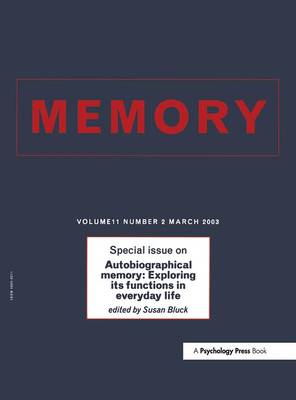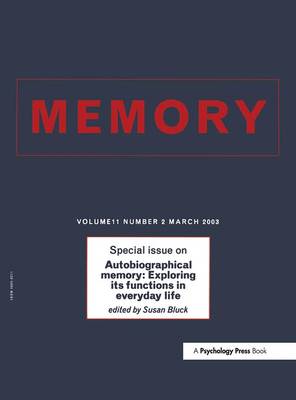
- Retrait gratuit dans votre magasin Club
- 7.000.000 titres dans notre catalogue
- Payer en toute sécurité
- Toujours un magasin près de chez vous
- Retrait gratuit dans votre magasin Club
- 7.000.0000 titres dans notre catalogue
- Payer en toute sécurité
- Toujours un magasin près de chez vous
Autobiographical Memory: Exploring Its Functions in Everyday Life
A Special Issue of Memory
Description
This special issue of the Psychology Press journal Memory spotlights and aims to encourage research that uses a functional approach to investigate autobiographical memory (AM) in everyday life. This approach relies on studying cognition, in this case AM, taking into account the psychological, social, or cultural-historic context in which it occurs. Areas of interest include understanding to what ends AM is used by individuals and in social relationships, how it is related to other cognitive abilities and emotional states, and how memory represents our inner and outer world. One insight gained by taking this approach is that levels and types of accuracy need not always be regarded as memory 'failures' but are sometimes integral to a self-memory system that serves a variety of meaningful ends of human activity. The papers in this issue include theoretical and empirical work by individuals who have made central contributions to our understanding of memory functions in their programmatic work. Previously hypothesized functions of AM fall into three broad domains: self, social, and directive. Each paper addresses how AM serves one or more of these functions and thereby examines the usefulness and adequacy of this trio.
Spécifications
Parties prenantes
- Editeur:
Contenu
- Nombre de pages :
- 122
- Langue:
- Anglais
- Collection :
Caractéristiques
- EAN:
- 9781841699356
- Date de parution :
- 10-04-03
- Format:
- Livre broché
- Format numérique:
- Trade paperback (VS)
- Dimensions :
- 203 mm x 266 mm
- Poids :
- 385 g

Les avis
Nous publions uniquement les avis qui respectent les conditions requises. Consultez nos conditions pour les avis.





